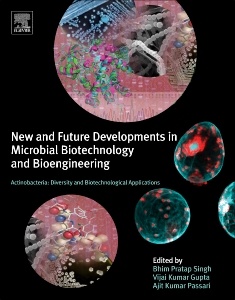Description
Actinobacteria: Diversity and Biotechnological Applications
New and Future Developments in Microbial Biotechnology and Bioengineering
Coordinators: Singh Bhim Pratap, Gupta Vijai Kumar, Passari Ajit Kumar
Language: English
Subjects for Actinobacteria: Diversity and Biotechnological Applications:
Keywords
16S rRNA; Abiotic stress; Actinobacteria; Adsorption and biomass; Antibiotics; Anticancer; Antimicrobial; Antimicrobials; Antitumor; Arthrobacter; Azo dyes; BGCs; Beta-lactams; Bio-fertilizers; Bio-inoculant; Bio-magnification; Bio-transformation; Bioactive compounds; Biocontrol; Biocontrol agents; Biocontrol mechanisms; Biodiversity; Biofuels; Biofungicides; Biopharmaceuticals; Bioremediation; Biosorption; Biosynthetic potential; Biotic stress; Biotransformation; Catalysis; Cellulases; Chemotaxonomy; Clinical significance; Cultivation method; Disease management; Diversity; Endophytic actinobacteria; Enzymes; Enzymes xenobiotic; Filamentous bacteria; Freshwater actinobacteria; Gene clusters; Genomics; Gram positive rods; Heavy metals; Heterologous expression; Holocellulose; Hot springs; Industrial applications; Industrial enzymes; Lytic enzymes; Medicinal plants; Metabolites; Metagenomics; Microbiome; Micrococcaceae; Molecular characterization; Molecular markers; NGS; Native plants of Algerian Sahara; Natural products; Natural products (NP); Nocardia; Nonribosomal peptide synthetase; Nutritional media; Omics technologies; Phytohormone; Plant growth promotion; Polyketide synthase; Polyketides; RAPD; REP-PCR; Ray fungi; Secondary metabolites; Sinomonas; Streptomyces; Surface sterilization; Sustainable agriculture; Taxonomy; Transcriptomic and metabolomic; Virulence biology; Xylanases
362 p. · 21.4x27.6 cm · Paperback
Description
/li>Contents
/li>Readership
/li>Biography
/li>Comment
/li>
Actinobacteria: Diversity and Biotechnological Applications: New and Future Developments in Microbial Biotechnology and Bioengineering, a volume in the series New and Future Developments in Microbial Biotechnology and Bioengineering series, offers the latest on the biotechnology of Kingdom actinobacteria, covering unique niches like their endosphere, rhizospheric soil and contaminated sites, etc. The book also covers the bioactive secondary metabolites obtained from actinobacteria and describes the application of microorganism (Actinobacteria) in plant growth promotion and in environmental cleanup. Finally, the book describes the biocontrol aspects of actinobacteria and how they can control fungal phytopathogens and the production of secondary metabolites.
1. Methods Used for the Recovery of Culturable Endophytic Actinobacteria: An Overview 2. Actinobacteria from Rhizosphere: Molecular Diversity, Distributions, and Potential Biotechnological Applications 3. Molecular Markers Used for Identification and Genomic Profiling of Plant Associated Endophytic Actinobacteria 4. Freshwater Actinobacteria: Potential Source for Natural Product Search and Discovery 5. Actinobacteria: Eco-Friendly Candidates for Control of Plant Diseases in a Sustainable Manner 6. Biocontrol Potential and Applications of Actinobacteria in Agriculture 7. Endophytic Actinobacteria From Native Plants of Algerian Sahara: Potential Agents for Biocontrol and Promotion of Plant Growth 8. Streptomyces in Plant Growth Promotion: Mechanisms and Role 9. Current Status and Applications of Actinobacteria in the Production of Anticancerous Compounds 10. Biotechnological Potential of Thermophilic Actinobacteria Associated With Hot Springs 11. The Role of Actinobacteria in the Production of Industrial Enzymes 12. Characterization of the Genus Sinomonas: From Taxonomy to Applications 13. Actinobacteria: A Highly Potent Source for Holocellulose Degrading Enzymes 14. Metabolic Potential and Biotechnological Importance of Plant Associated Endophytic Actinobacteria 15. Biology of Pathogenic Actinobacteria: Nocardia and Allied Genera 16. Novel Perspectives of Biotic and Abiotic Stress Tolerance Mechanism in Actinobacteria 17. Detection and Expression of Biosynthetic Gene Clusters in Actinobacteria 18. Recent Trends in Biosorption of Heavy Metals by Actinobacteria 19. Antimicrobial Compounds From Actinobacteria: Synthetic Pathways and Applications 20. Bio-Augmentation of Actinobacteria and Their Role in Dye Decolorization 21. Future Prospects of Actinobacteria in Health and Industry 22. Genomics of Actinobacteria With a Focus on Natural Product Biosynthetic Genes
Researchers and students in biotechnology, biochemical engineering, chemistry/biochemistry in academia, government labs and corporate labs and provides new ideas to the upcoming research students about various biological applications of Kingdom actinobacteria.
Vijai K. Gupta has previously worked as- Senior Scientist, ERA Chair VALORTECH, Estonian University of Life Sciences, Estonia; Senior Scientist, ERA Chair Green Chemistry, Tallinn Technical University, Estonia and Senior Researcher, Molecular Glycobiotechnology Group Department of Biochemistry. NUI Galway Ireland. Currently, he working as Professor (Associate) of Biochemistry at UM6P University, Mo
- Includes an overview of all types of actinobacteria, source and enzymatic activity
- Lists various bioengineering methods for the production of these enzymes
- Reviews numerous industrial applications of actinobacteria, i.e., crop improvement, removal of heavy metals, etc.
- Offers unique coverage of the application of actinobacteria in bioremediation processes
- Explores the plant growth promoting potential of endophytic actinobacteria
- Describes biosynthetic potential genes associated with actinobacterial genome




